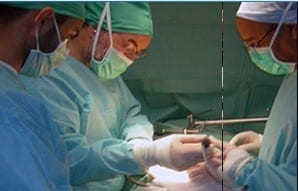
Scientists believe they can develop drugs which will stop organs failing meaning a transplant isn’t necessary
A scientific breakthrough into the way human tissue is left scarred could mean fewer people need organ transplants.
Scientists hope to create new drugs to treat fibrotic diseases that attack the liver, lungs or kidneys, a study in Nature Medicine journal suggests.
Experts have discovered that a molecule on specialised cells, known as myofibroblasts, can regulate the production of scar tissue – a bit like a switch.
The team studied specially bred mice with fibrosis and found removing the molecule – called alpha v integrin – from the cells protected them from the organ failure.
And when the mice were treated with a new experimental drug designed to block the molecule, they were protected from liver and lung fibrosis.
Dr Neil Henderson, a Wellcome Trust clinical scientist and consultant hepatologist at Edinburgh University/Medical Research Council Centre for Inflammation Research, said: “When tissue scarring becomes severe, affected organs do not work properly and currently the only treatment for end-stage organ failure is transplantation.
Go deeper with Bing News on:
Fibrosis
- From mentorship to marriage: A lung transplant love story
Married since 2005, Gary and Carrie's bond is unbreakable, forged by their shared experiences. ST. LOUIS — After meeting through BJC's Lung Transplant mentoring program, two patients fell in love and ...
- 2 Top Growth Stocks to Buy Right Now and Hold Forever
Rachel Warren has positions in Johnson & Johnson. The Motley Fool has positions in and recommends CRISPR Therapeutics, Kenvue, Shockwave Medical, and Vertex Pharmaceuticals. The Motley Fool recommends ...
- Life transformed for five-year-old... all thanks to wonder cystic fibrosis drug
EXCLUSIVE: Last year mum Chloe Browne feared her five year-old's cystic fibrosis was slowly destroying his health - but it's all changed after taking wonder pill kaftrio.
- $100B Vertex Pharma Working To Recreate $10B Cystic Fibrosis Success - This Time Focused On Pain Management Drugs
Vertex Pharmaceuticals Inc‘s (NASDAQ:VRTX) blockbuster drug Trikafta for cystic fibrosis (CF) has shown remarkable efficacy, potentially extending the lives of some patients by up to 45 years. Despite ...
- New prototype that regenerates stem cells may repair IPF scarring
Researchers developed NZ-97, an inhalable drug that stimulates the growth of stem cells in the lungs, potentially repairing scarring in IPF.
Go deeper with Google Headlines on:
Fibrosis
[google_news title=”” keyword=”Fibrosis” num_posts=”5″ blurb_length=”0″ show_thumb=”left”]
Go deeper with Bing News on:
New therapies to treat fibrosis
- $100B Vertex Pharma Working To Recreate $10B Cystic Fibrosis Success - This Time Focused On Pain Management Drugs
Vertex Pharmaceuticals Inc‘s (NASDAQ:VRTX) blockbuster drug Trikafta for cystic fibrosis (CF) has shown remarkable efficacy, potentially extending the lives of some patients by up to 45 years. Despite ...
- New prototype that regenerates stem cells may repair IPF scarring
Researchers developed NZ-97, an inhalable drug that stimulates the growth of stem cells in the lungs, potentially repairing scarring in IPF.
- Scientists discover a new signaling pathway and design a novel drug for liver fibrosis
A healthy liver filters all the blood in your body, breaks down toxins and digests fats. It produces collagen to repair damaged cells when the liver is injured. However, a liver can produce too much ...
- Vertex Announces European Commission Approval for KALYDECO® to Treat Infants With Cystic Fibrosis Ages 1 Month and Older
Vertex Pharmaceuticals (Nasdaq: VRTX) today announced that the European Commission has granted approval for the label expansion of KALYDECO® (ivacaftor) for the treatment of infants down to 1 month of ...
- Its blockbuster cystic fibrosis treatment costs $300,000 a year. Now Vertex wants to solve the opioid crisis
The number of people living with CF worldwide is now 105,000, up from 70,000 in 2012, according to estimates from US non-profit the Cystic Fibrosis Foundation — a rise that experts attribute both to ...
Go deeper with Google Headlines on:
New therapies to treat fibrosis
[google_news title=”” keyword=”New therapies to treat fibrosis” num_posts=”5″ blurb_length=”0″ show_thumb=”left”]









